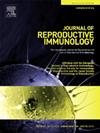Linking altered gut microbiome to polycystic ovarian syndrome through immune mediated pathway
IF 2.9
3区 医学
Q3 IMMUNOLOGY
引用次数: 0
Abstract
Polycystic ovarian syndrome (PCOS) is an endocrine disorder characterized by hyperandrogenism, ovulatory dysfunction, and metabolic disturbances. A balanced gut microbiome plays an important role in managing homeostatic signalling pathways in the body. These pathways regulate normal bodily functions but can become dysregulated under dysbiotic conditions. Recent research has highlighted the role of gut microbiota in the pathogenesis of polycystic ovarian syndrome. Key Bacterial taxa such as Akkermansia, Prevotella, Lactobacillus, Escherichia coli, Bacteroides and Ruminococcaceae (family-level) whose abundance is correlated with disease severity. At dysbiotic conditions, the pathobionts bypass the tight gut junction, enters the systemic circulation and trigger an immunomodulatory response subsequently releasing proinflammatory cytokines. Initially, first line and second line defence mechanisms are generated through immune responses such as IgG-mediated mechanisms. The immunological responses and inflammation cause macrophage pyroptosis, hormonal imbalance, and polycystic ovaries, followed by insulin resistance and hyperinsulinemia. Also, neuroendocrine alterations including dysregulation of GnRH secretion is influenced by gut-derived metabolites. The current review aids in understanding the mechanism pathway between gut microbiota and polycystic ovaries. Understanding ‘The Gut-PCOS axis’ explores various ways for targeting gut microbiota through prebiotics, probiotics and synbiotics as a potential therapeutic approach for polycystic ovarian syndrome management.
通过免疫介导途径将肠道微生物组改变与多囊卵巢综合征联系起来
多囊卵巢综合征(PCOS)是一种以高雄激素、排卵功能障碍和代谢紊乱为特征的内分泌疾病。平衡的肠道微生物群在管理体内稳态信号通路中起着重要作用。这些途径调节正常的身体功能,但在生态失调的条件下会变得失调。最近的研究强调了肠道微生物群在多囊卵巢综合征发病机制中的作用。关键细菌分类群,如Akkermansia, Prevotella, Lactobacillus, Escherichia coli, Bacteroides和Ruminococcaceae(科水平),其丰度与疾病严重程度相关。在生态失调的情况下,病原体绕过紧密的肠道连接,进入体循环并引发免疫调节反应,随后释放促炎细胞因子。最初,一线和二线防御机制是通过免疫反应产生的,如igg介导的机制。免疫反应和炎症引起巨噬细胞热亡、激素失衡和多囊卵巢,随后发生胰岛素抵抗和高胰岛素血症。此外,包括GnRH分泌失调在内的神经内分泌改变也受到肠源性代谢物的影响。本文综述有助于了解肠道菌群与多囊卵巢之间的机制途径。了解“肠道-多囊卵巢综合征轴”探索通过益生元、益生菌和合成菌靶向肠道微生物群的各种方法,作为多囊卵巢综合征治疗的潜在治疗方法。
本文章由计算机程序翻译,如有差异,请以英文原文为准。
求助全文
约1分钟内获得全文
求助全文
来源期刊
CiteScore
6.30
自引率
5.90%
发文量
162
审稿时长
10.6 weeks
期刊介绍:
Affiliated with the European Society of Reproductive Immunology and with the International Society for Immunology of Reproduction
The aim of the Journal of Reproductive Immunology is to provide the critical forum for the dissemination of results from high quality research in all aspects of experimental, animal and clinical reproductive immunobiology.
This encompasses normal and pathological processes of:
* Male and Female Reproductive Tracts
* Gametogenesis and Embryogenesis
* Implantation and Placental Development
* Gestation and Parturition
* Mammary Gland and Lactation.

 求助内容:
求助内容: 应助结果提醒方式:
应助结果提醒方式:


